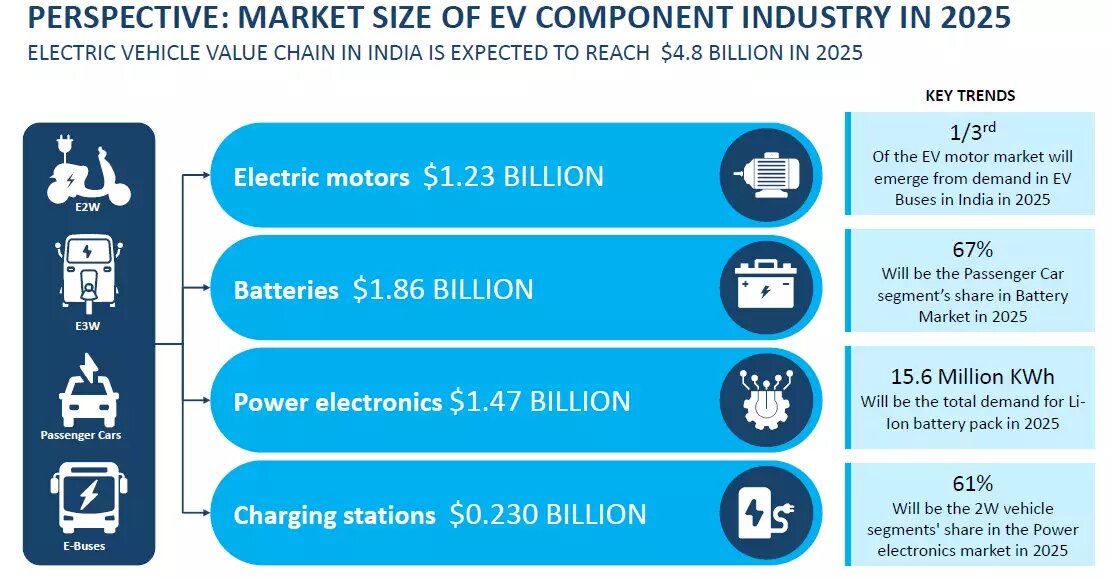Recently, the United Kingdom (UK) has decided to ban the sale of new petrol and diesel cars by 2030. Also, as part of its green agenda, the UK strives to establish the enabling infrastructure for electric vehicles (EVs).
Such a big move that could have a ripple effect on the green movement around the world. In India, the government is also keen on replacing fossil fuel-driven vehicles with EVs. In 2017 began by setting an ambitious target of 100% electric cars by 2030.
However, due to resistance from the automotive industry and fears of job losses forced the government to lower the target. Thus, without government supporting investment in EV infrastructure upfront and passing the buck to the automotive industry and consumers, it would be difficult to bring transformation in the mobility sector.
India’s Necessity For EVs
- Controlling Pollution: According to the International Council for Clean Transportation (ICCT), an estimated 74,000 premature deaths were attributable to air pollution from transportation tailpipe emissions in India in 2015.
- Also, many top polluted cities in the world are from India. For example, New Delhi.
- Mitigating Climate Change: In December 2019, in the Climate Risk Index 2020 released by the environment think tank, Germanwatch, India’s rank has worsened from the 14th spot in 2017 to 5th in 2018 in the global vulnerability ladder.
- This makes it all the more reason for India to make electric cars and vehicles a priority in the fight against the reliance on fossil fuels.
- Sustainable Energy Options: Shifting towards EVs will help India to reduce oil dependency while solving the challenge of energy scarcity and moving towards renewable and clean sources of energy.
Associated Challenges
- Lack of Battery Cell Manufacturing: There is a complete absence of primary battery cell manufacturing in India which poses the risk of increasing trade deficit.
- At the moment, most manufacturers rely on batteries imported from Japan, China, Korea and Europe.
- Building Charging Infrastructure: Another big challenge is the development of charging infrastructure which will need to be combined with existing refuelling stations and at alternative locations closer to homes.
- Limited Grid Capacity: According to a Niti Aayog report, India’s EVs market needs a minimum of 10 GW of cells by 2022, which would need to be expanded to about 50 GW by 2025.
- However, currently, India is able to add only 20 GW every year to its grid for all of our other increasing energy needs. Thus, the fulfilment of the requirement of 10GW additional capacity only for EVs would be a huge task.
- Local Issues: Bringing transportation decisions closer to the people is understandable and necessary. Transport challenges such as congestion, affordability, infrastructure and transit systems availability are localized issues, impede the standardization of EVs.
- Also, it will be a challenge to create a competitive advantage in electric vehicle manufacturing, or even a market for them, given that India does not have the infrastructure or deep pockets like China (world's current leader in electric mobility).
Current Policy of Indian Government
- FAME Scheme: The Indian government has created momentum through its Faster Adoption and Manufacturing of (Hybrid &) Electric Vehicles schemes that encourage, and in some segments mandates the adoption of electric vehicles (EV), with a goal of reaching 30% EV penetration by 2030.
- If these aims are realised by 2030, they will generate an estimated saving of up to 474 Millions of tonnes of oil equivalent (Mtoe) and 846 million tonnes of net CO2 emissions over their lifetime.
- Fiscal Incentives: Various fiscal demand incentives have been put in place to spur the production and consumption of EVs and charging infrastructure - such as income tax rebates, exemption from customs duties, etc.
Way Forward
- Increasing R&D in EVs: The Indian market needs encouragement for indigenous technologies that are suited for India from both strategic and economic standpoint.
- Since investment in local research and development is necessary to bring prices down, it makes sense to leverage local universities and existing industrial hubs.
- India should work with countries like the UK and synergise EV development.
- Sensitising Public: Breaking away the old norms and establishing a new consumer behaviour is always a challenge. Thus, a lot of sensitisation and education is needed, in order to bust several myths and promote EVs within the Indian market.
- Viable Electricity Pricing: Given current electricity prices, home charging may also be an issue if the generation is from thermal power plants run on coal.
- Thus, a shift in the electricity generation landscape as a whole is what is required to facilitate the growth of electric cars.
- In this context, India is on track to become one of the largest solar and energy storage markets by 2025.
- A combination of solar-powered grid solutions that are organised with a general improvement in grid resilience will ensure adequate charging infrastructure for EV’s being a green option.
- Creating the Closed-Loop Mobility Ecosystem: Subsidizing manufacturing for an electric supplychain will certainly improve the EV development in India.
- Along with charging infrastructure, the establishment of a robust supply chain will also be needed.
- Further, recycling stations for batteries will need to recover the metals from batteries used in electrification to create the closed-loop required for the shift to electric cars to be an environmentally-sound decision.
Conclusion
Operationalizing mass transition to electric mobility for a country of 1.3 billion people is not an easy feat. Thus, a strong common vision, an objective framework for comparing state policies and a platform for public-private collaboration are needed.

Comments
Post a Comment